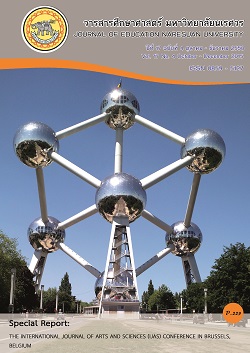แนวคิดทางเลือกของนักเรียนในวิชาฟิสิกส์
Main Article Content
Abstract
บทคัดย่อ
แนวคิดในวิชาฟิสิกส์ที่ถูกต้องและเป็นแนวคิดทางวิทยาศาสตร์นั้นถือว่ามีความสำคัญอย่างมากในการอธิบายปรากฏการณ์ต่างๆ รอบๆตัว และสามารถนำไปประยุกต์ใช้ในชีวิตประจำวันได้ นอกจากนั้นแล้วยังเป็นพื้นฐานในการเรียนรู้แนวคิดที่มีความซับซ้อนขึ้นหรือแนวคิดขั้นสูง แต่บางครั้งแนวคิดที่ถูกต้องทางวิทยาศาสตร์ทางฟิสิกส์อาจยากเกินความเข้าใจของผู้เรียน จึงทำให้ผู้เรียนเกิดแนวคิดทางเลือกที่คลาดเคลื่อน งานวิจัยทั้งในและต่างประเทศพบว่าแนวคิดทางเลือกของนักเรียนในวิชาฟิสิกส์ยังคลาดเคลื่อนจากแนวคิดทางวิทยาศาสตร์ โดยเฉพาะในเรื่อง แรงและการเคลื่อนที่ แสงและการมองเห็น เสียงและการได้ยิน ไฟฟ้า และคลื่นและปรากฏการณ์คลื่น ทั้งนี้อาจเป็นเพราะ แนวคิดทางฟิสิกส์ส่วนใหญ่เป็นนามธรรม การใช้ภาษาที่ไม่ถูกต้องในการบรรยายแนวคิด นักเรียนไม่มีความรู้พื้นฐานมาก่อนหรือยังไม่เข้าใจความรู้พื้นฐาน ความไม่ชัดเจนของหนังสือเรียน และนักเรียนจะใช้ความจำในการตอบคำถามและแก้โจทย์ปัญหาโดยไม่มีความเข้าใจ
คำสำคัญ: ครูฟิสิกส์/ แนวคิดทางเลือก/ ฟิสิกส์/ วิทยาศาสตรศึกษา
Abstract
Scientific concepts in Physics are considered to be important in explaining the phenomena around us and can be applied in everyday life. Moreover, there are the basics to learn the concepts that are more complex or advanced concepts. But sometimes scientific concepts in physics may be beyond the understanding of the students. It allows the students get various alternative concepts. Research on science education both in Thailand and oversea showed that the students hold alternative concepts in physics especially in concept of force and motion, light and visions, sound and hearing, electricity and wave and wave phenomena. Causes of these alternative concepts are most of Physics concept are abstract, the students are familiar with incorrect term to explain the concepts, students do not have a basic concept, the unclear of textbooks, and students usually use the memory in answering questions and solving problems without understanding.
Keywords: Physics Teachers/ Alternative Conceptions/ Physics/ Science Education
Article Details
The owner of the article does not copy or violate any of its copyright. If any copyright infringement occurs or prosecution, in any case, the Editorial Board is not involved in all the rights to the owner of the article to be performed.


